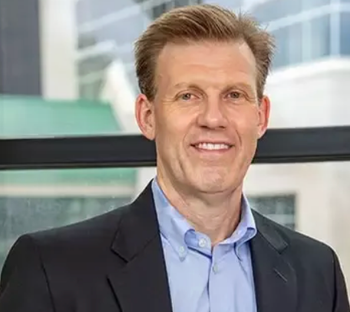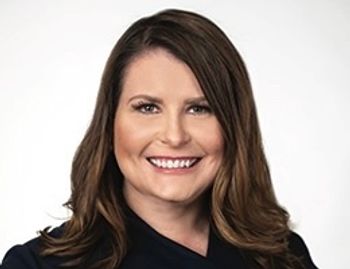
Dr. Uché Blackstock urges courage on health equity: ‘Be brave’ | HLTH 2025

The founder and CEO of Advancing Health Equity and best-selling author says the climate may be different, but the work must continue.
Las Vegas – Dr. Uché Blackstock concedes that it’s a different environment for those looking to close disparities in health care for marginalized communities.
Still, she says the work must endure, and she adds that it is continuing, even with different labels.
In a conversation on the main stage during the HLTH Conference Monday afternoon, Blackstock urged hospitals and health systems to remain committed to efforts to addressing health equity.
“My wish is just to be brave,” she said.
Blackstock is the founder and CEO of Advancing Health Equity, which works with hospitals, academic systems, nonprofit organizations and others to help close disparities in care. She’s also the author of “Legacy,” her best-selling book that addresses racism in medicine. She talked about health equity in a conversation with Dr. Bayo Curry-Winchell, the founder and chief medical officer of Clinicians Who Care.
Hospitals looking to improve health equity in their communities need to closely examine the data on outcomes in their own organizations.
“Look at your data,” Blackstock said. “If you're not collecting your data, collect the data. And then also, I think the community engagement piece is very important. Talking to your patients about what their experiences are in the hospital when they seek care.”
Blackstock offered a strong business case for addressing health equity, noting that it costs “hundreds of billions of dollars” to have a health care system that doesn’t prioritize the best outcomes for everybody.
While some health systems are working to offer better care for underserved communities, Blackstock noted that the environment has shifted.
Hospitals stood up programs in the early 2000s focusing on marginalized communities, she said. Now, health systems, hospitals and companies are looking differently at those efforts to gauge their return on investment. They’re looking at patient outcomes and want to see if money was saved in terms of utilization of healthcare services.
“We have seen sort of a reframe of how these conversations happen,” Blackstock said. “We know that equity is always going to be important. That's really what it means, is quality access for everybody, quality care for everybody. And I think maybe in the past, the way that it's been framed, some people have felt ostracized by it. But really, it's that we all have the same goal for our patients.”
Following up, Curry-Winchell said, “That goal is to help that person have the best care possible. And in order to do that, you have to know what the challenges that they're facing, the barriers that they face.”
While the environment has changed, Blackstock said she remains encouraged by the work that organizations are doing to help everyone get the care that they deserve.
“What's giving me a lot of reassurance in this moment is that there's a lot of companies, organizations that are still committed to these values, the values of providing quality care to every single patient, making sure that every patient really reaches their highest health potential,” Blackstock said.
Some of those programs may have different names, but that doesn’t reflect a change in mission or lack of commitment, she said.
“Call it quality assurance, quality improvement,” Blackstock said. “They're calling it community engagement, population health. They're just going by different terms. But we always knew that it wasn't necessarily about the language, right? It really is about the work.”
“And so I was going to encourage people who are here and still deeply committed to these issues to know that we're here,” she said. “Organizations are still out there that are doing the hard work.”
She said her group is also hosting leadership roundtables, where people working on health equity can talk about what’s working, and what’s not working. She says those forums also ensure “they don’t feel so alone.”
Blackstock said that the companies her organization works with still care deeply about this work. They are working with communities and elevating voices in those communities. She also stressed the importance of leadership buy-in to sustain momentum.
Organizations engaging in health equity need to help each other, she said.
“It’s still going to be a long road,” Blackstock said. “I think we have to band together, coalition build for other folks who are doing this work, really innovate, and think about best practices.”
- Read more:
Seeing momentum for value-based care






















































































